Residente: ‘The urban genre fights over nonsense. Nobody says anything about Palestine. I don’t want to belong to that scene’
He is an iconic Puerto Rican rapper and a transcendental voice for Latin America. Two decades after his alternative rap group Calle 13 was founded, he’s releasing his second solo album later this month. Blunt and brave, he speaks to EL PAÍS candidly about his struggles with depression, the global issues that distress him and the indifference of new musical stars
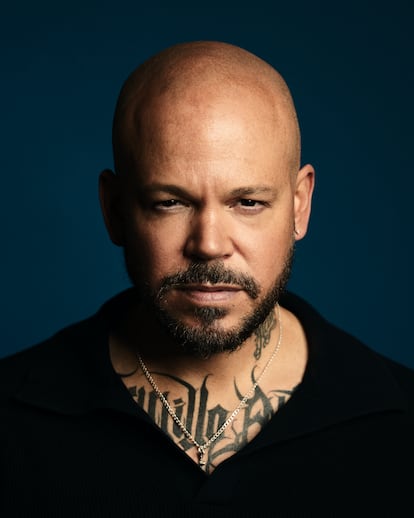
Residente’s smile is half-hearted. Something prevents René Pérez Joglar, 45, from being able to smile properly. His sullen eyes accompany the tiredness and expressiveness of his face, which peeks out from under the hood of his wool jacket.
It’s a cold Saturday morning in December when the iconic Puerto Rican rapper — one of the musicians with the most Latin Grammys (he took home 21 with his band Calle 13 and won five on his own) — arrives for his interview with EL PAÍS in Madrid. In the elevator, he warns: “I haven’t slept much, brother. I’ve had a lot of work.” The mist of the street seems to surround him as he sits down to chat in an empty room. He confesses that he thought about canceling the interview.
Considered to be the best rapper in the history of the Spanish language — according to the music magazine Billboard — and one of the most independent and fierce voices in Latin music in the 21st century, he seems exhausted. So much so that he shows signs of something more worrying: it’s as if he has stopped caring about anything.
More than three years have had to pass for Residente to finally sit down to talk to EL PAÍS. He was supposed to do so after he released René, a monumental autobiographical song that’s one of the most notable of his career. It was March 2020: the pandemic struck and the interview had to be delayed. Then, a lot of other things occurred — whether in Puerto Rico, Spain, or the United States — that always prevented an in-person meeting.
It’s difficult to assess the career of this artist, who has been so essential to Latin American music since he became known in 2004 through Calle 13, along with his stepbrother Visitante and their half-sister, iLe. Panamanian salsa legend Rubén Blades sees this rapper as an equal, despite their stylistic differences. Uruguayan singer Jorge Drexler and the Argentine rock star Andrés Calamaro feel the same way. Bad Bunny has described Residente as his role model: he once cried because his idol let him sing with him. Argentine rapper Trueno has called the Puerto Rican a “spokesperson for the Latin community,” praising him for being an example of someone who “fights back against presidents” and “conveys a message of unity.”
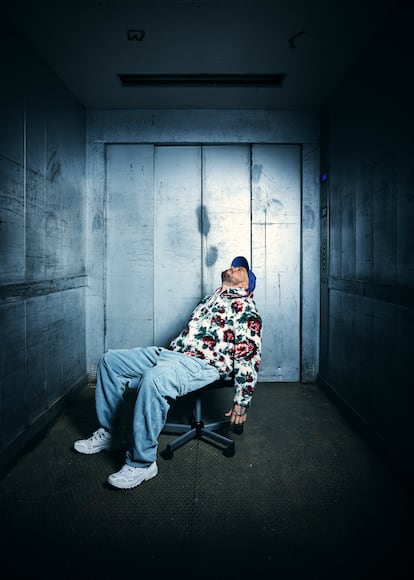
Over the course of the three weeks that he’s been in Madrid, Residente has postponed his interview a couple of times. He’s not allergic to the press (although he doesn’t spend much time engaging with the media, either). He’s an excellent conversationalist and — unlike most stars — doesn’t watch his words carefully. He’s frank and direct — even warm — and speaks without fear of entering into controversies or defending political and social causes. “I have this anger when I get upset and I don’t shut up. I’m like that,” he shrugs. The morning of the meeting, the musician arrives to talk about his latest album, which will be released on February 22. It is titled Las letras ya no importan (Lyrics don’t matter anymore, in English), his second solo album since he put out Residente in 2017.
He spent the entire day before the interview filming one of the music videos that will accompany the release of the new album. With temperatures below zero, rain and snow, the filming took place in the city of Segovia. It included the participation of actress Penélope Cruz and singer Sílvia Pérez Cruz. According to the musician’s team, he’s under a lot of stress, having worked long hours over the past several days. The cold has also taken a toll on him. “Where I’m from, this doesn’t happen,” the Caribbean singer grumbles, pointing with his gaze to the grayish, leaden sky.
Residente is also an actor and director. In previous music videos for the songs René, Problema cabrón and Quiero ser baladista — and in his latest, Ron en el piso — his cinematic passion comes through.
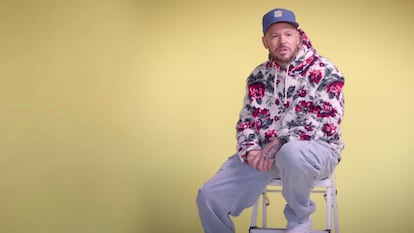
The latest song could well be a biographical continuation of René, in which he reviews stellar moments from his 20-year-long career. In the video, he witnesses his own funeral: his mother, his brothers, the mother of his son Milo and others say goodbye to him. “I prefer to work in film than get on stage. I’ve already started music and I’m not going to leave it, but I’m going to [work] with both things,” he affirms. His commitment to cinema now surpasses music. It culminated with his leading role in a movie directed by Alessandra Lacorazza — In The Summers — that premiered at the Sundance Film Festival on January 22. And earlier last year, Residente announced that he has embarked on a project with Alexander Dinelaris — the co-writer of Birdman — to create the script for a film about the Puerto Rican revolutionary José Maldonado Román, known as Águila Blanca (or, White Eagle).
Sitting in the empty room, he speaks to EL PAÍS without hesitation, about any subject matter. Still, there are reasons for his serious and dejected expression. He says that he’s “preoccupied with getting older” and, shortly after starting to chat, he assures this newspaper that he’s quite out of place in music and other aspects of his life. Death — which marks his latest music video — seems to be part of the explanation. It will not be until days later, in a different conversation, when the singer reveals the mystery and gives a name and, above all, a number: Valentina, 313.
Shortly before he leaves Spain, the musician invites EL PAÍS to continue the conversation more calmly in his room at the Ritz, the hotel he’s staying at in Madrid. He’s going over the still-unpublished video clips, including the one that he recorded with Penélope Cruz. This is the song titled 3:13, which will be included in his new album.
In the living room of his suite, barefoot, he explains that his song responds to a number that has had “magical” connotations for him, “or something like that.”
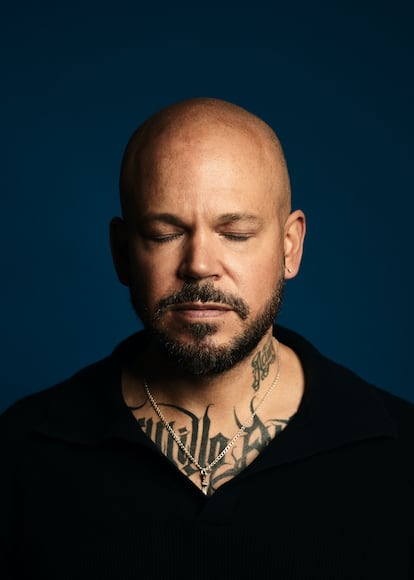
That number is linked to the memory of his friend, Valentina, a 30-year-old violinist who committed suicide. The death of his friend caused him great anxiety. “I don’t believe in many things, but what happened with this number wasn’t normal,” he emphasizes. The last WhatsApp message that he received from Valentina (before she jumped off a cliff) was sent at 3:13 in the afternoon. He shows the message on his phone and points out the time.
One day, he noticed that same time by chance: he was in the lobby of a hotel when a pianist started playing. In that moment, he remembered his dead friend, picked up his cell phone and saw that the time of the message sent by Valentina coincided with the time of that very moment when he was rereading it. And then, there was yet another coincidence: his hotel room was 313. So, the musician made a decision to call the song he was composing 3:13, in honor of his friend. He also decided to use the violin music by Valentina’s sister, who also recommended that he include Spanish singer Sílvia Pérez Cruz.
Finally, in the recording studio, the last of the coincidences occurred: the producer of 3:13 — who was unaware of the story — mistakenly called Sílvia by the name of his friend: Valentina. Nobody could explain why.
The album begins with a voice message from Valentina, in which she asks Residente to make a song with some verses in French for a future album. Next, 3:13 plays. It’s a powerful song, with a string symphony and a piano piece, in which Residente sings (in Spanish): “We have to live without missing anything / until our heart explodes / until they make us leave the party.”
At the moment, however, Residente’s heart doesn’t seem to have a strong rhythm, nor does he see himself going to a party. “I feel like it doesn’t matter whether we’re around or not,” he confesses. “It happened to me when I wrote René and it continues to happen to me since Valentina’s death and since two other friends died of overdoses. The bad thing about delving too deep into [all of this] is that it removes you from life.”
Residente still wants to live, but he says that, today, he feels like a stranger in his own life. When he published René in February 2020, he acknowledged that he started writing the song the day after he had to call his mother, because he had thought about jumping off the hotel balcony. That terrifying feeling of defeat hasn’t stopped invading him since then. “I don’t know, brother, I have to analyze carefully why this is happening to me. It’s not something as simple as work pressure. It’s more complex. In general, I think it comes from the things that are going on in the world. I don’t feel good on tour. I do concerts because I have to pay the rent, but the whole process doesn’t fulfill me,” he explains. “I went to a therapist in New York — a really cool Iranian woman who I chose, because all the other therapists I had were chosen by my partners — and I told her, ‘I feel like everything I do isn’t enough.’”
The weeks in Madrid — in the middle of recording the music video — have passed with the same feeling of inadequacy, he confirms. An emptiness that contrasts with the excesses of the night. “The other day, I told my brother: ‘I think I’m depressed, Gabriel.’ And he asked me: ‘Why do you say that, brother?’ Well, because I’m partying and having sex every day with different people…” he pauses suddenly, remaining silent for a few seconds. “I guess I’ve been so close to death that I feel like I want to live like I’m going to die tomorrow,” he adds.
When asked what he would do if he knew that he was going to die tomorrow, he replies: “The same thing as last night.” With a half-smile, the musician shifts a little in his chair. “This feels more like a therapy session than an interview.”
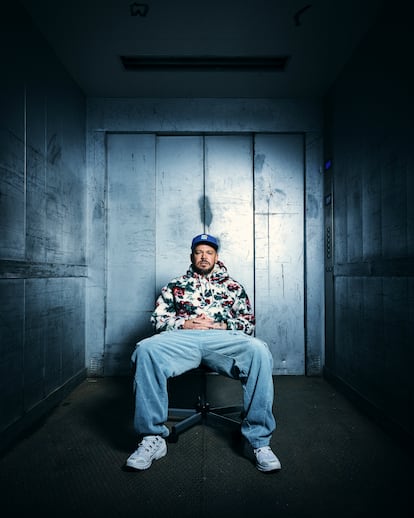
Residente has made the personal something artistic. One could even say that his life and his songs are inseparable. Everything you hear is everything you see, and vice-versa. Sometimes, this can be a virtue… other times, it’s an Achilles’ heel. His previous solo album — which was named after him (Residente) — was inspired after he took a DNA test that revealed he had roots from different parts of the world. He decided to visit his roots and then record with local artists from Armenia, Burkina Faso, China, France, Ghana, Niger and Russia. Now, the new album is called Las letras ya no importan. He says that this title is a statement about who he is.
“I feel outside of what’s happening in music,” he notes. “I’m in a very different reality. Today’s reality is very much about clothes, fashion, magazines... It’s something that’s deeply rooted in your image, in being cool, more than in what you say and do with your music. These musicians have created their own space and, for them, it’s not necessary to do certain things that are important to me.”
He specifies that the most important thing in music is “honesty.” “It’s the main thing in art,” he emphasizes. “In this new space, honesty isn’t valued equally, because image matters more.”
Residente repeats the word “honesty” a lot in his interview on the cloudy Saturday morning and in the subsequent meeting in his hotel room. For him, the word — which has become a slogan in many promotional campaigns nowadays — takes on the meaning of a commandment. It can be seen throughout his career — it’s also perceived whenever he comments on any issue. His level of self-demand regarding this quality seems higher than that of the average star. At least, Residente feels that this is the case. Being honest means that he doesn’t deceive himself, although it does mean that he clashes with other heavyweights on the world stage.
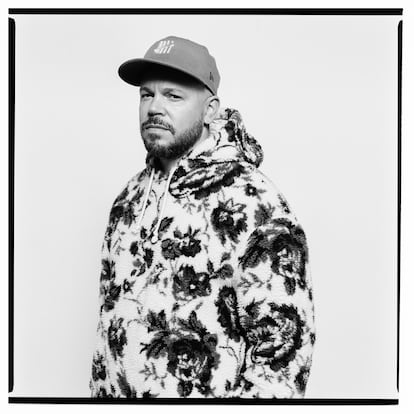
One of those clashes happened in March 2022. His collaboration with Bizarrap was a hit, partly because it relentlessly attacked J Balvin. The Colombian reggaeton star had called for a boycott of the 2021 Latin Grammy Awards, claiming that there was a lack of urban artists. During the gala, Residente read a speech full of emotion and admiration for Rubén Blades, one of his heroes. Blades was honored as the Latin Recording Academy Person of the Year for his contributions to Latin music and activism.
BZRP Music Sessions Vol. 49 consisted of eight minutes and 39 seconds, in which J Balvin was reduced to a pulp. Residente unleashed a storm of adjectives, including “motherfucking liar,” “idiot,” “coward,” “racist,” “whitey from school,” “imbecile with hair dye” and “failure.” Perhaps the most commented-upon verse was: “You’re faker than a hot dog without ketchup or bread.” Separately, Residente made another hot dog-related comment about J Balvin: “Your music is like a hot dog cart. Almost everybody likes it, but when those people want to eat well, they go to a Michelin-starred restaurant.”
Today, Residente is avoiding feuds. Instead of talking about J Balvin, he limits himself to pointing out that “everything is included in the second verse of my song.” The verse reads: “I’m a little uneasy while the urban genre watches / Peeking out like a crocodile in the Nile River.” And adds: “I like J Balvin as much as I like most urban artists nowadays.”
Residente is still as restless, although today he seems more fatigued. It’s hard for him to feel at ease when he belongs to a musical environment that he feels is far away from his principles. “The urban genre fights over bullshit. Nobody says anything about Palestine. That’s why I don’t want to belong to that scene.” He recalls a recent event: the last Latin Grammy gala, held this past November in Seville. “No one made a single mention of Palestine. There were some who told me: ‘Well, René, I just don’t know what to say.’ And I answered them: ‘What do you mean you don’t know, cabrón?’ It’s so serious that we should stop playing. What do we have left of humanity? All of this frustrates me.”
When asked if he thinks that musicians lack courage, he sighs. “I think it’s worse: they’re indifferent. As León Gieco’s song says: ‘I only ask God / That war not be indifferent to me.’”
Residente certainly cannot be accused of indifference. During his interview with EL PAÍS, he says that he wants to write something against “the massacre” being committed against Palestinians. He fulfills his promise, using his social media platform to denounce the “genocidal bombings” by the Israelis against the Palestinian population. Near the end of 2023, he also publicly apologized for a verse from a hit Calle 13 song called Atrévete-Te-Te (2004), in which he had a line that compared an explosion to a Palestinian. He recognized that this was a false and harmful depiction. Over the past two decades, he has filmed music videos in occupied Palestine, in celebration of the Palestinian cause.
In his songs, Residente denounces inequalities and attacks the abuses of the powerful. Calle 13 is still remembered as having launched a renewed social critique in Latin American music, based on hip hop and traditional sounds. He and his brother and sister were censored for four years in their native Puerto Rico after the 2009 Grammy Awards, when Residente said — on camera — that the then-governor of Puerto Rico, Luis Fortuño, was “a son of a bitch” for his poor management of the country and his dismissal of 30,000 public employees. The municipal government of San Juan prohibited his concert from being held at the Roberto Clemente Coliseum when Calle 13 was at the peak of its career. In 2015 — after five studio albums and 24 Grammy Awards (21 of them Latin) — the band dissolved.
In his solo career, Residente hasn’t remained silent, nor has he stopped confronting the government of Puerto Rico. In the summer of 2019, he led demonstrations against the disaster management of Governor Ricardo Rosselló during Hurricane María, which caused more than 3,000 deaths. He attacked the governor for his sexist and xenophobic attitudes. The musician mobilized Bad Bunny, Ricky Martin, Luis Fonsi, Daddy Yankee, Marc Anthony and the actor Benicio del Toro. He also composed the song Bellacoso, which served to celebrate Rosselló's resignation.
“At one point, I assumed that social responsibility, but not anymore. It was good for me to let it go,” the musician confesses. He also wrote the song Latinoamérica, an anthem that — inspired by the legendary Mercedes Sosa — highlights the strength of the region in the face of the abusive political and economic interventions of the United States. “The Americans are still there, sticking their nose into Latin America, though not with the same force as in the 1980s. Now, the force is in Israel. If I had a rock, I would go there and throw it at a tank,” he declares.
“The new generations forget the past,” he laments. “They’re like the algorithm that allows you to see what interests you. But you don’t see clearly.”
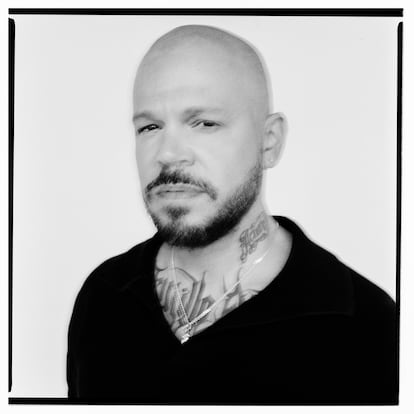
Residente still seeks to combat the mental algorithm with his music. In his upcoming album, there’s a song with a certain apocalyptic air called Artificial inteligente, in which he sings: “The future of history is to be left without a past / Now, it’s time to see the world with your eyes closed.”
Residente may not be smiling now, but his eyes are still wide open to the troubles of Latin America. Argentina — a country where he enjoys enormous popularity — is one of his big concerns today. “The left has failed so much that others take advantage of the situation. It always happens,” he reflects. “I don’t agree with Milei at all, but he’s the result of a bad previous government and a desperate society. That’s what happened with Trump.” He warns of the consequences of covering one’s eyes in the face of reality: “The extreme right has always been present. I saw it in Chile when Sebastián Piñera won [in 2018]. I went to a club and I remember that, on the street, I found people shouting: ‘Long live Pinochet!’”
Nowadays, on the musical scene, it’s not easy to find artists capable of articulating ideological discourses on political issues. But Residente has always been a different case. He never abandons his ideas. And, despite being low in energy, he states: “If the extreme right becomes strong, I’ll be there with everything to counter it. I’m not going to keep quiet.”
Night falls and, on the table in the suite, there are half-empty bottles of water and a plate with a leftover Spanish omelette. Residente gets up to further draw the curtains of the large windows that overlook the Prado Museum. In the first session of the interview — on a cloudy Saturday morning — he tempered his feelings about being misplaced in music and in life: “I’m privileged, even more so when I see everything that’s happening in Palestine. I can’t even come close to saying that I’m having a bad time. I have a family, siblings and my son.” However, as the conversation progresses, he speaks candidly about his struggles with depression. He has long recognized that some things in the world affect him too much.
Behind the artist, there’s always the person, although this is difficult to see in the music business. Or perhaps, in his case, there’s simply no separation possible. If so, it would be one more reason that conditions the smile of Residente and René, two names for the same being who — when saying goodbye to EL PAÍS — promises: “I’ll be back, brother.”
He’s referring to his return to Spain, where he’s scheduled to perform in the fall. However, after listening to his new album and spending hours talking, he sounds like he’s referring to something more profound.
At that very moment, his smile shines.
Translated by Avik Jain Chatlani.
Sign up for our weekly newsletter to get more English-language news coverage from EL PAÍS USA Edition
Tu suscripción se está usando en otro dispositivo
¿Quieres añadir otro usuario a tu suscripción?
Si continúas leyendo en este dispositivo, no se podrá leer en el otro.
FlechaTu suscripción se está usando en otro dispositivo y solo puedes acceder a EL PAÍS desde un dispositivo a la vez.
Si quieres compartir tu cuenta, cambia tu suscripción a la modalidad Premium, así podrás añadir otro usuario. Cada uno accederá con su propia cuenta de email, lo que os permitirá personalizar vuestra experiencia en EL PAÍS.
¿Tienes una suscripción de empresa? Accede aquí para contratar más cuentas.
En el caso de no saber quién está usando tu cuenta, te recomendamos cambiar tu contraseña aquí.
Si decides continuar compartiendo tu cuenta, este mensaje se mostrará en tu dispositivo y en el de la otra persona que está usando tu cuenta de forma indefinida, afectando a tu experiencia de lectura. Puedes consultar aquí los términos y condiciones de la suscripción digital.









































